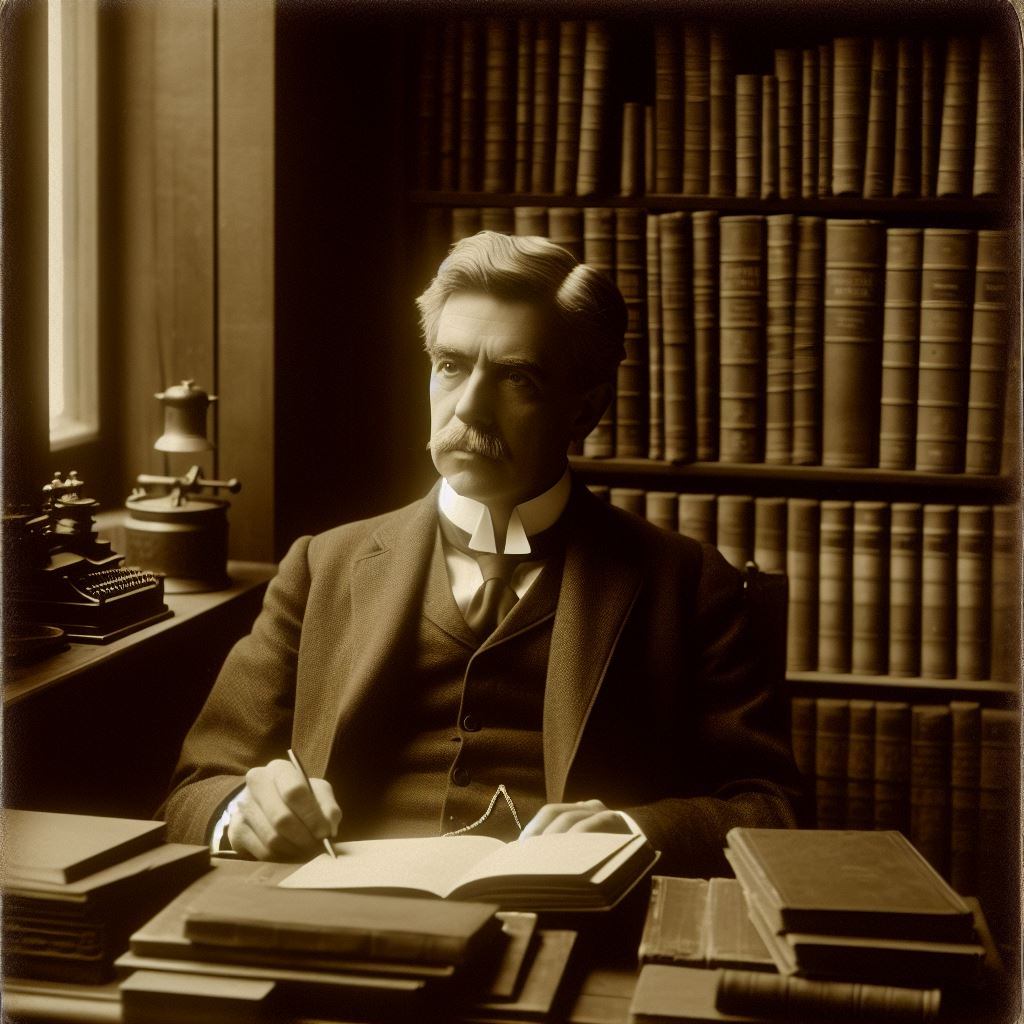Introduction
Librarians play a crucial role in society, serving as keepers of knowledge and gatekeepers to information.
They connect people with resources, promote literacy, and contribute to the development of communities.
Embark on a literary journey exploring the lives of influential American librarians, shaping knowledge and leaving a lasting legacy.
These information guardians curated literary treasures, profoundly impacting the cultural and intellectual landscape of the United States.
In this blog post, we will explore the lives and contributions of famous US librarians who have left a lasting impact on the field.
Explore the tales of influential figures dedicated to wisdom and information dissemination, leaving an indelible mark on libraries and beyond.
Melvil Dewey
Overview of Dewey’s life and career as a librarian
Melvil Dewey, born on December 10, 1851, was an American librarian and educator who made a lasting impact on the field.
Dewey’s career as a librarian began at the age of 21 when he was appointed as the librarian of Amherst College in Massachusetts.
Dewey Decimal Classification system and its impact on library organization
In 1873, Dewey devised the Dewey Decimal Classification system, which revolutionized library organization.
This system assigns a unique numerical code to each book based on its subject, allowing for easy navigation and retrieval of materials.
The Dewey Decimal Classification system quickly gained popularity and became widely adopted in libraries worldwide.
Dewey’s classification system had a profound impact on library organization.
It provided a standardized method for arranging books, ensuring that similar subjects were grouped together.
This made it easier for librarians to assist patrons in locating specific books and improved overall efficiency in library operations.
Dewey’s role in library education and advocacy for women in the profession
Furthermore, Dewey played a crucial role in library education. He established the first library school at Columbia College (now Columbia University) in 1887.
- This educational institution trained aspiring librarians, equipping them with the necessary skills and knowledge to excel in their profession.
- Dewey’s efforts in library education contributed to the professionalization of librarianship and elevated its status as a respected occupation.
- Dewey was also an advocate for women in the library profession.
- In an era when women faced significant barriers to entry in many professions, Dewey actively supported their inclusion in librarianship.
- He believed that women were well-suited for library work due to their attention to detail and organizational skills.
- Dewey actively recruited women to his library school and encouraged their involvement in library associations.
Furthermore, Dewey’s commitment to gender equality extended to his advocacy for equal pay.
He fought for equal wages for female librarians, believing that their contributions should be valued and remunerated on par with their male counterparts.
Dewey’s efforts paved the way for greater gender equality within the library profession and inspired many women to pursue careers as librarians.
In essence, Melvil Dewey was a renowned librarian who left an indelible mark on the profession. His Dewey
The decimal Classification system revolutionized library organization and made the retrieval of books more efficient.
Transform Your Career Today
Unlock a personalized career strategy that drives real results. Get tailored advice and a roadmap designed just for you.
Start NowAdditionally, Dewey’s establishment of the first library school and advocacy for women in librarianship further advanced the field.
Dewey’s contributions continue to shape the way libraries are organized and operated today.
Read: From Print to Digital: Adapting Skills in US Libraries
Nancy Pearl
Background Information on Nancy Pearl and Her Contributions to Librarianship
Nancy Pearl, born on January 12, 1945, in Detroit, Michigan, is a renowned American librarian, author, and speaker.
She obtained her Master of Library Science degree from the University of Michigan in 1967 and started her career as a librarian in the Detroit Public Library.
Throughout her professional journey, Pearl held various positions in different libraries, including the Seattle Public Library, where she made a significant impact.
Discussing Nancy Pearl’s Concept of “The Rule of Four” and its Impact on Readers’ Advisory
One of Pearl’s notable contributions to librarianship is her concept of “The Rule of Four,” which she formulated to help librarians assist readers in finding books they will enjoy.
According to Pearl, this rule emphasizes the importance of finding at least four points of connection between a book a reader enjoyed and a potential recommendation.
By using this approach, librarians can create a personalized reading experience for each individual.
“The Rule of Four” enables librarians to better understand readers’ preferences and interests by delving deep into their reading history, favorite authors, genres, and themes.
By uncovering these connections, librarians can recommend books that align with readers’ tastes and increase the likelihood of an enjoyable reading experience.
This method promotes a more personalized and meaningful interaction between librarians and patrons.
Highlighting Nancy Pearl’s Role as a Passionate Advocate for Libraries and Literacy
Apart from her expertise in readers’ advisory, Nancy Pearl is a passionate advocate for libraries and literacy.
She firmly believes that libraries play a vital role in fostering a love for reading and enhancing communities.
Through speaking engagements and writing, she has significantly influenced librarians and the public, raising awareness about libraries’ essential contributions.
Pearl believes that libraries are not just repositories of books, but vibrant hubs that connect people with knowledge, resources, and opportunities.
She advocates for libraries to adapt and evolve with changing times, embracing technology and offering innovative programming that engages diverse audiences.
Pearl firmly believes that libraries have the power to transform lives and create stronger communities through their commitment to accessibility, education, and cultural enrichment.
Nancy Pearl’s work extends beyond libraries; she is also a prolific author.
Showcase Your Business Today
Reach thousands of readers actively exploring professional services. Publish your business profile and grow your audience now.
Publish NowShe has written several books, including the best-selling “Book Lust” series, which provides reading recommendations across various genres.
In her books, Pearl combines her love for literature with her passion for connecting readers with books that they can truly enjoy.
In general, Nancy Pearl has made a lasting impact on librarianship through her innovative approach to readers’ advisory and her unwavering advocacy for libraries and literacy.
Her concept of “The Rule of Four” has revolutionized the way librarians assist readers in finding suitable books, fostering more personalized reading experiences.
Pearl’s passion for libraries and commitment to promoting knowledge has inspired many, elevating the role of libraries in society.
Read: The Evolution of School Counseling in the US

Carla Hayden
Carla Hayden and her significance as the first African American woman to serve as the Librarian of Congress
In this context, Carla Hayden, the first African American woman to serve as the Librarian of Congress, has made a lasting impact on the US library system.
Her efforts to make the Library of Congress more open and accessible to the public have been commendable.
Carla Hayden’s appointment as the Librarian of Congress in 2016 marked a historical milestone.
As the first African American woman in this position, she shattered barriers and inspired many.
Hayden’s efforts to make the Library of Congress more open and accessible to the public
One of Hayden’s significant achievements has been her commitment to increasing accessibility to the Library of Congress.
She initiated various initiatives to make the library more user-friendly and inclusive.
Hayden recognized the importance of utilizing technology to provide greater access to the library’s vast collections.
Under her leadership, the Library of Congress developed user-friendly online platforms and digital resources.
This allowed people from all over the world to access and explore the library’s extensive collection.
Moreover, Hayden strongly advocated for expanding the library’s physical spaces to accommodate more visitors.
She realized that a welcoming and accessible environment is crucial for encouraging public engagement with the library.
Hayden’s efforts resulted in the renovation and enhancement of various library facilities.
She successfully transformed the library into a hub for learning and exploration, embracing the 21st-century demands.
Her championing of diverse voices and promotion of cultural heritage preservation
Another significant aspect of Hayden’s tenure is her championing of diverse voices.
She recognized the importance of representing all communities and sought to amplify underrepresented perspectives.
Hayden established programs and partnerships that aimed to collect and highlight works from diverse cultures and backgrounds.
By doing so, she ensured that the Library of Congress remains a true reflection of the nation’s rich cultural heritage.
Cultural heritage preservation has also been a priority for Her during her time as Librarian of Congress.
She understood the fragility of historical documents and artifacts and actively worked towards their conservation.
Hayden supported various preservation initiatives to safeguard the library’s invaluable treasures for future generations.
Her dedication to preserving cultural heritage earned her recognition and respect within the library community and beyond.
Her leadership has been instrumental in redefining the role of the Librarian of Congress.
She proved that a librarian can be a dynamic agent of change, expanding access, diversity, and cultural preservation.
Her legacy serves as an inspiration for future librarians, emphasizing the great potential of the library profession.
In summary, Carla Hayden’s tenure as the Librarian of Congress has been extraordinary.
From her efforts to increase accessibility to her advocacy for diverse voices and cultural heritage preservation, Hayden has made a lasting impact on the library system.
Her leadership and vision have set a new standard for librarianship and serve as a testament to the transformative power of libraries in our society.
Read: Diversity in School Counseling: Bridging Cultural Gaps
Dewey and Melvil
In the world of libraries, the name Melvil Dewey is one that cannot be forgotten.
A pioneer in library science, Dewey made a lasting impact through his creation of the Dewey Decimal Classification system.
The Dewey Decimal Classification system revolutionized library organization.
It provided a standardized way to categorize books and materials, making them easily accessible to library patrons.
Dewey’s system categorized knowledge into ten main classes, each with further subdivisions.
The connection between Melvil Dewey and the Dewey Decimal Classification system
However, the connection between Melvil Dewey and his classification system goes beyond mere innovation.
Showcase Your Business Today
Reach thousands of readers actively exploring professional services. Publish your business profile and grow your audience now.
Publish NowDewey recognized the need for libraries to be a democratic institution, providing equal access to information for all individuals.
The controversy surrounding Dewey’s personal beliefs and actions, and its impact on his legacy
Yet, while Dewey advocated for equal access, his personal beliefs and actions have been a constant source of controversy.
Despite his contributions to the library world, Dewey was known for his inappropriate and discriminatory behavior towards women.
Dewey’s alleged sexist remarks and actions have cast a shadow over his legacy.
Many argue that his personal beliefs and behaviors are not compatible with the values of inclusivity and respect that libraries strive to uphold.
How discussions around Dewey’s legacy have led to reevaluation and revision of library practices
As a result of this controversy, discussions surrounding Dewey’s legacy have sparked reevaluation and revision of library practices.
Librarians and scholars have begun to question whether Dewey’s name should still be attached to the classification system.
Some argue that the Dewey Decimal Classification system should be renamed to reflect a more equitable and inclusive approach.
They believe that keeping Dewey’s name embedded in library practices perpetuates a patriarchal and discriminatory mindset.
On the other hand, proponents of keeping the Dewey name argue that erasing Dewey from the classification system would be to deny his contributions to library science.
They argue that acknowledging both his achievements and flaws is a more balanced approach.
This debate has led to the adoption of alternative classification systems that attempt to address the shortcomings of the Dewey Decimal Classification.
Some libraries have implemented the Library of Congress Classification system or have developed their own unique methods.
The reevaluation of Dewey’s legacy has also prompted a broader examination of library practices.
Libraries are now more focused on creating inclusive spaces that cater to diverse communities and promote greater cultural understanding.
Efforts are being made to ensure that library collections represent a wide range of perspectives and reflect the needs and interests of all patrons.
Librarians are actively seeking to diversify their collections and provide non-biased access to information.
In a nutshell, Melvil Dewey and the Dewey Decimal Classification system are undeniably interconnected.
However, the controversy surrounding Dewey’s beliefs and actions has forced the library community to reevaluate its practices and strive for greater inclusivity.
Libraries continue to evolve and adapt, aiming to provide equal access to knowledge for everyone.
Explore Further: Advanced Degrees for School Counselors: Are They Worth It?
Impact of famous US librarians
Throughout history, there have been influential librarians who have left a lasting impact on the profession and society as a whole.
Their contributions have not only shaped library services and education but have also paved the way for advocacy efforts.
Even in the digital age, their ideas and approaches remain relevant and continue to shape the field of librarianship.
1. Transformative impact on the profession
- Melvil Dewey: Dewey’s development of the Dewey Decimal Classification system revolutionized library organization and accessibility.
- S.R. Ranganathan: Ranganathan’s Five Laws of Library Science laid the foundation for modern library practices and principles.
- Betty J. Turock: Turock’s leadership in library associations led to advancements in professional development and standards.
These librarians transformed the profession by introducing innovative ideas and practices that continue to shape the way libraries serve their communities.
2. Shaping library services, education, and advocacy
- Andrew Carnegie: Carnegie’s philanthropy funded the construction of public libraries, making knowledge accessible to the masses.
- Margaret Mann: Mann’s advocacy for library education programs strengthened the profession by emphasizing the importance of formal training.
- Patricia Glass Schuman: Schuman’s leadership in the American Library Association promoted intellectual freedom and diversity within libraries.
These librarians played crucial roles in advancing library services, shaping education for librarians, and advocating for the core values of the profession.
3. Continuing relevance in the digital age
- Michael Gorman: Gorman’s emphasis on intellectual integrity and critical information evaluation is vital in combating misinformation in the digital era.
- Carla Hayden: Hayden, the first female and African American Librarian of Congress, focuses on preserving digital content and expanding access to information.
- Lawrence Clark Powell: Powell’s contributions to library facility design remain significant, even as libraries adapt to changing digital landscapes.
These librarians recognized the evolving landscape of information and technology, adapting their approaches to ensure the continued relevance of libraries in the digital age.
The impact of famous US librarians on the profession and society cannot be understated.
Through their innovations, advocacy, and forward-thinking perspectives, they have shaped library services, education, and the values upheld by librarians today.
Whether it was developing classification systems, funding public libraries, or promoting intellectual freedom, their ideas and approaches remain relevant in the digital age.
Librarians continue to build upon their legacies, ensuring that libraries thrive as essential pillars of knowledge and community engagement.
Read: The Ethics and Morality of Librarianship in the USA
Conclusion
The blog post discussed the key points about famous US librarians who made a lasting impact in the field.
These librarians were trailblazers, revolutionizing the way libraries functioned and expanding access to knowledge.
It is important to honor and learn from these librarians because they paved the way for modern library practices and advocated for intellectual freedom.
Their contributions have shaped the field and continue to impact future generations of librarians.
We should encourage readers to further explore the contributions of these librarians to gain a deeper appreciation for the field.
By studying their work, we can understand the challenges they faced and the innovative solutions they implemented.
Exploring the achievements of renowned US librarians inspires current and future librarians to push boundaries and nurture a passion for reading and knowledge.
Their stories serve as a reminder of the power and importance of libraries in society.
Showcase Your Business Today
Reach thousands of readers actively exploring professional services. Publish your business profile and grow your audience now.
Publish NowBy valuing and recognizing these librarians, we can uphold their legacy and ensure that their impact continues to resonate in the field of librarianship.
Let us celebrate their contributions and continue to strive for excellence in the pursuit of knowledge.
[E-Books for Sale]
The Big Book of 500 High-Paying Jobs in America: Unlock Your Earning Potential
$19.99 • 500 High-Paying Jobs • 330 pages
Explore 500 high-paying jobs in America and learn how to boost your career, earn more, and achieve success!
See All 500 High-Paying Jobs of this E-Book
1001 Professions Without a Degree: High-Paying American Jobs You Can Start Now
$19.99 • 1001 Professions Without a Degree • 174 pages
Discover 1001 high-paying jobs without a degree! Unlock career tips, skills, and success strategies for just $19.99!




